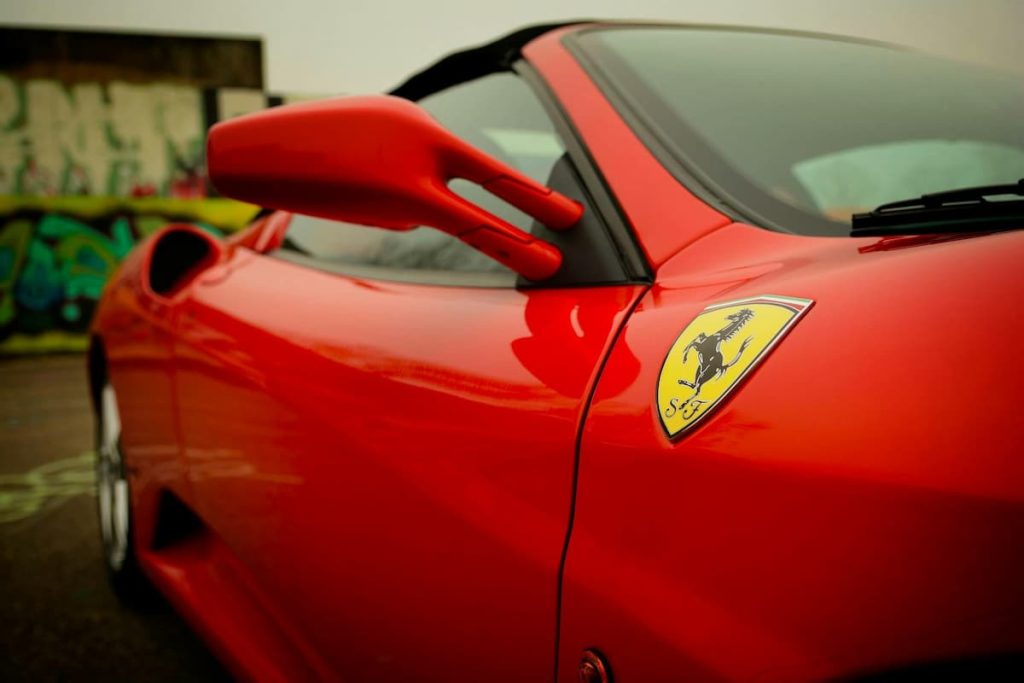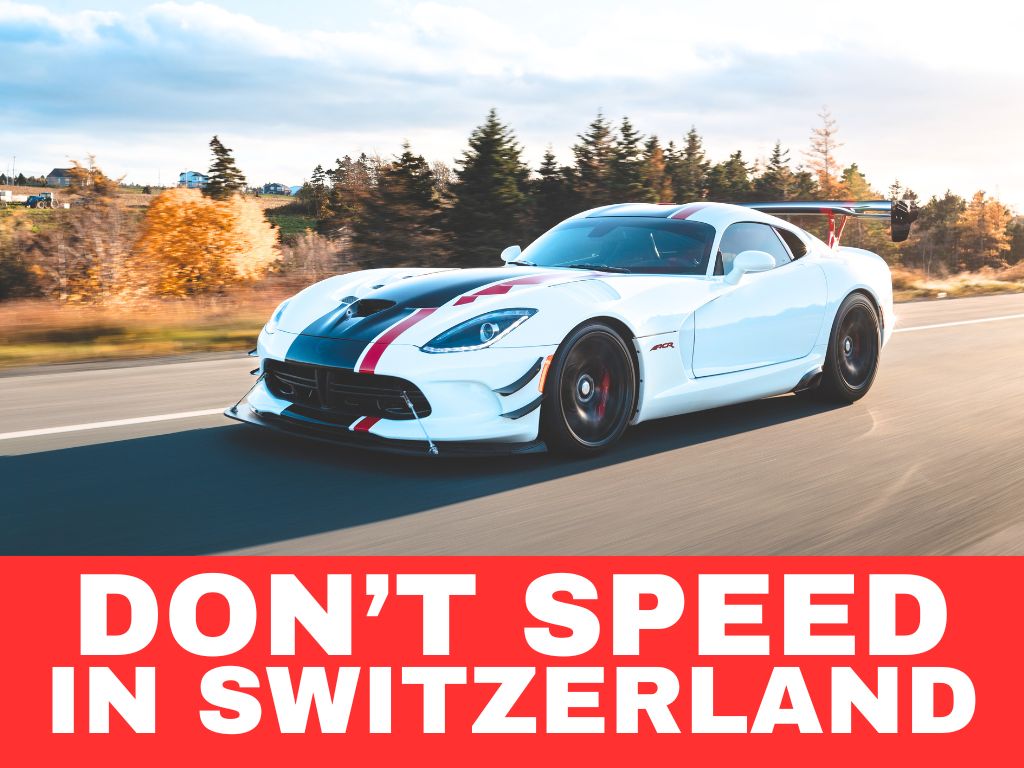Driving in Switzerland is a pleasure, with beautiful winding mountain roads and smooth highways.
But it is also one of the strictest countries in Europe when it comes to speeding. Whether you are driving your own car from abroad or using a rental, it helps to understand how the system works so you can avoid expensive surprises.
How Speeding Penalties Work
In Switzerland, speeding offences are divided into two categories.
Minor offences are handled with a fixed fine known as an “order fine,” which ranges from 20 to 300 Swiss francs. Once you pay, the case is closed.
If you exceed the limit by more than the allowed amount, it becomes a criminal case. That means higher, income-based penalties and possibly a driving ban.
In very serious situations, the authorities can even seize your vehicle.
Speed Measurement and Tolerance

Before calculating your fine, police deduct a small margin to account for measurement accuracy. For example, three kilometers per hour are subtracted for laser readings under 100 km/h, and five kilometers per hour for higher speeds.
So if a camera records you driving 59 in a 50 zone, the official speed used for the fine is 56. That means you were six kilometers over the limit.
Typical Fines
In a 50 zone, driving one to five kilometers over the limit costs about 40 francs. Six to ten kilometers over is about 120 francs, and eleven to fifteen kilometers over is 250 francs. Anything sixteen kilometers above the limit is considered a criminal offence.
Outside built-up areas, where the limit is usually 80, expect 40 francs for up to five kilometers over, 100 francs for six to ten, 160 francs for eleven to fifteen, and 240 francs for sixteen to twenty. Driving more than twenty-one kilometers over the limit becomes a criminal case.
On motorways, where the limit is generally 120, fines start at 20 francs for one to five kilometers over, 60 francs for six to ten, 120 francs for eleven to fifteen, 180 francs for sixteen to twenty, and 260 francs for twenty-one to twenty-five. Anything more than twenty-six kilometers over the limit leads to a criminal case.
Of course, these numbers are not set in stone and vary a little across the country. But they are a good guide to how expensive speeding can get in Switzerland!
| Road Type / Limit | Typical Excess | Approx. Fine (fixed, if within order range) | Beyond → criminal case |
|---|---|---|---|
| Town / 50 km/h zone | +1 to 5 km/h | CHF 40 | +16+ over |
| +6 to 10 km/h | CHF 120 | ||
| +11 to 15 km/h | CHF 250 | ||
| Outside towns (≈ 80 km/h zones) | +1 to 5 km/h | CHF 40 | +21+ over |
| +6 to 10 km/h | CHF 100 | ||
| +11 to 15 km/h | CHF 160 | ||
| +16 to 20 km/h | CHF 240 | ||
| Motorway (≈ 120 km/h zones) | +1 to 5 km/h | CHF 20 | +26+ over |
| +6 to 10 km/h | CHF 60 | ||
| +11 to 15 km/h | CHF 120 | ||
| +16 to 20 km/h | CHF 180 | ||
| +21 to 25 km/h | CHF 260 |
| Case | What Happens | Notes / Key Rules |
|---|---|---|
| Minor speeding (within “order fine” range) | Fixed fine (CHF 20 to CHF 300) | After “tolerance” deduction. If you pay, case closed. |
| Beyond “order fine” threshold | Criminal proceedings | Income-based penalties, licence suspension, possibly vehicle confiscation. |
| “Racer / chauffard” cases (extreme excess) | Severe criminal sanctions | Multi-year bans, jail time in extreme cases under Via sicura. |
Want To Save This For Later?
Serious Speeding Offences

Switzerland has strict laws for extreme speeding known as “Via Sicura.”
Suppose you exceed the limit by about forty kilometers in a thirty zone, fifty in a fifty zone, sixty outside towns, or eighty on the motorway. In that case, it is considered a “racer” offence.
These cases bring very harsh penalties, including long driving bans, heavy income-based fines, and even prison sentences.
Some drivers have lost both lost their vehicles and been banned from Switzerland for driving double the speed limit. So, even though it is “fun” to speed around the mountain roads of Switzerland, the consequences can be extreme!
One driver caught driving 290 km/hr faced a 1 Million Franc fine
(swissinfo.com)
What Happens to Foreign Drivers and Rental Cars
If the police stop you in person, they can ask you to pay immediately or make a deposit if you are not a Swiss resident. This is a normal procedure and helps ensure the fine is settled.
The fine is sent to the vehicle owner if a speed camera catches you.
In the case of a rental car, the rental company receives the notice and forwards your details to the authorities. 👉👉 NOTE: Most companies also charge an administrative fee, usually between 30 and 50 francs.
Unpaid fines can escalate to criminal cases or debt collection, and severe cases may cause problems if you try to re-enter Switzerland later.
Since May 2024, Switzerland and Germany can enforce each other’s traffic fines. If you live in Germany, that means Swiss fines can now be collected through the German authorities and vice versa.
Real-Life Examples
A tourist in a rental car drives 59 in a 50 zone. After the tolerance deduction, that becomes 56, or six kilometers over. The fine is about 120 francs, and the rental company passes the notice to the driver with an extra processing fee.
A German driver is caught at 141 on a motorway where the limit is 120. After the deduction, it becomes 134, or fourteen over, another 120 franc fine. If ignored, it can now be legally enforced in Germany.
A driver going 101 in a 50 zone is classified as a “racer.” This can result in a criminal case, licence suspension, and possibly prison.
Final Tips
Speed cameras are everywhere, including tunnels and mountain roads. Navigation apps that warn about cameras are disabled in Switzerland, and using radar detectors is illegal.
The easiest way to avoid problems is simple: stick to the speed limits, watch for signs when limits change, and remember that even small excesses can cost a lot in Switzerland.



This is a helpful guide, though it makes Swiss speed limits seem almost *generous* with that 3-5 km/h tolerance! Paying the order fine feels almost like a sneaky victory sometimes. But explaining to your German insurer about that +134 km/h speed on the motorway after tolerance deduction? Now *that’s* a story you wont get off the hook from! Good to know those racer penalties are real – maybe the mountain roads should come with a potential multi-year ban sign! Always worth remembering, especially with rental cars, that a tiny fine can turn into a much larger administrative fee and hassle. Thanks for the reality check before we all try to beat the system!